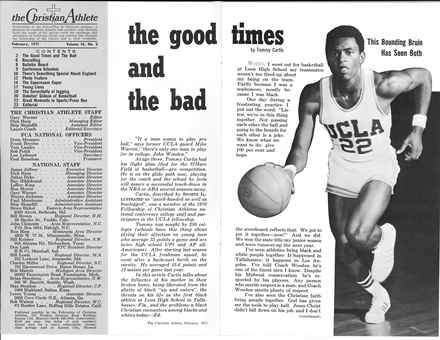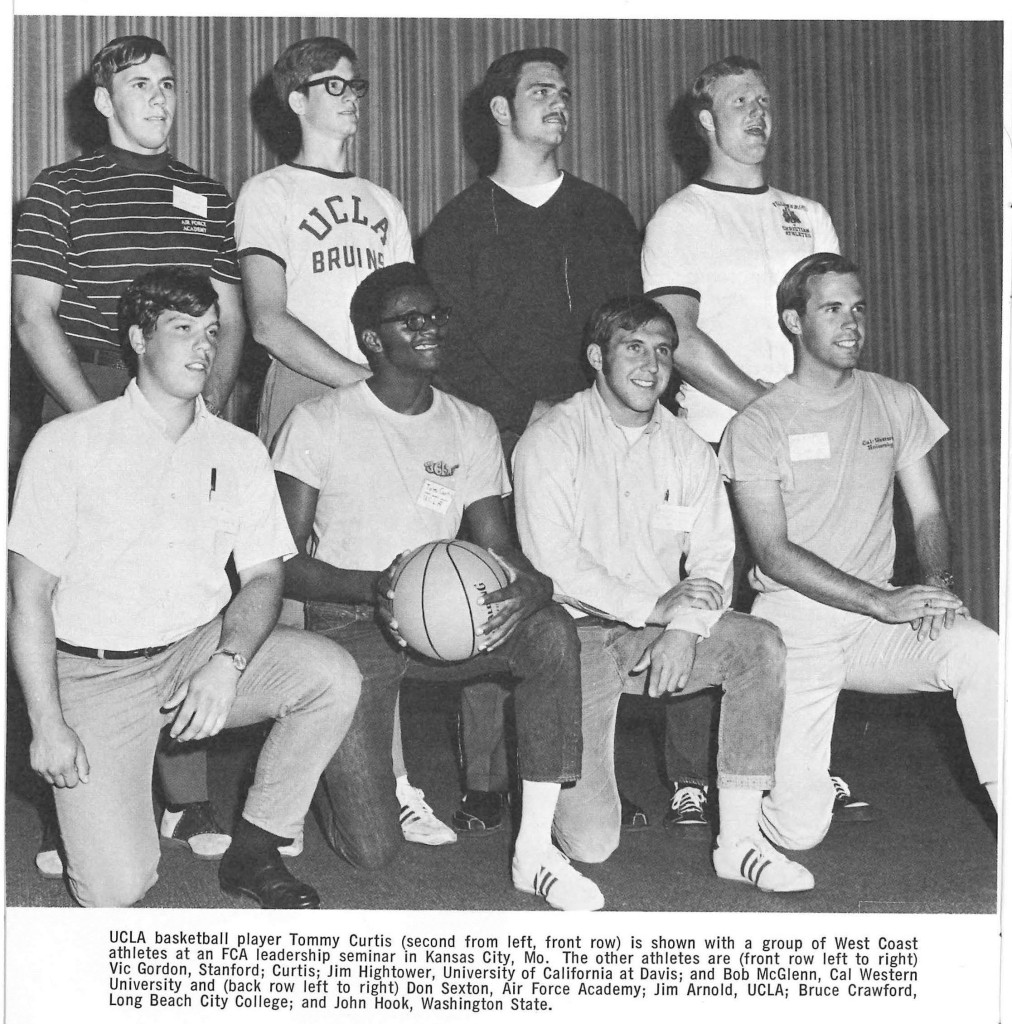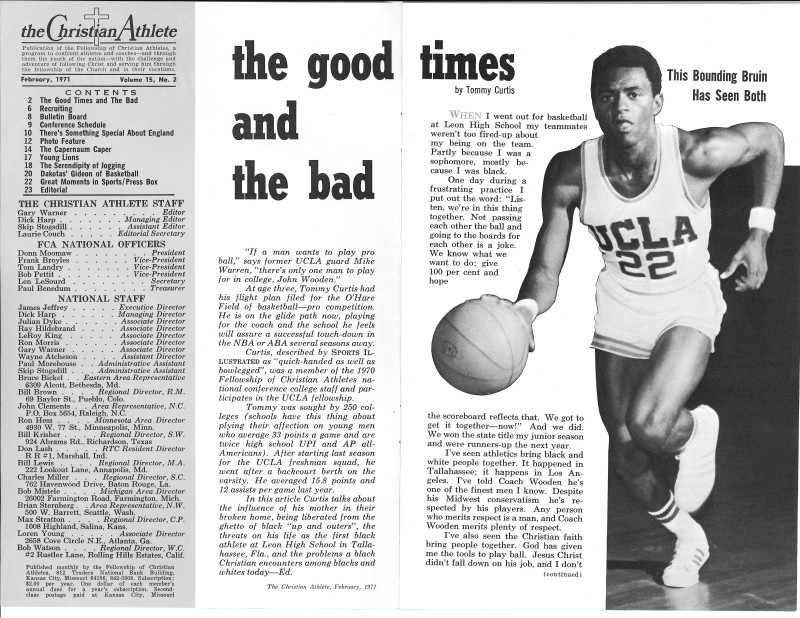 The following article appeared in the February, 1971 issue of The Christian Athlete. At the time, UCLA was in the middle of its dominance of the college basketball scene, and a Tommy Curtis, a young guard from Tallahassee, Fla., with strong ties to the Fellowship of Christian Athletes, was sitting out the season as a redshirt after starring for UCLA’s freshman team the previous season. Curtis would go on to play on the varsity team over the next three years, helping lead the Bruins to national championships in 1972 and 1973. With the Bruins back in the Sweet 16 in this year’s tournament, we thought we’d take a look back at Tommy Curtis’ story, which also gives us a glimpse into the social life of the 1960s and 1970s, in this story from the #FCA60 vault.
The following article appeared in the February, 1971 issue of The Christian Athlete. At the time, UCLA was in the middle of its dominance of the college basketball scene, and a Tommy Curtis, a young guard from Tallahassee, Fla., with strong ties to the Fellowship of Christian Athletes, was sitting out the season as a redshirt after starring for UCLA’s freshman team the previous season. Curtis would go on to play on the varsity team over the next three years, helping lead the Bruins to national championships in 1972 and 1973. With the Bruins back in the Sweet 16 in this year’s tournament, we thought we’d take a look back at Tommy Curtis’ story, which also gives us a glimpse into the social life of the 1960s and 1970s, in this story from the #FCA60 vault.
“If a man wants to play pro ball,” says former UCLA guard Mike Warren, “there’s only one man to play for in college, John Wooden.”
At age three, Tommy Curtis had his flight plan filed for the O’Hare Field of basketball – pro competition. He is on the glide path now, playing for the coach and the school he feels will assure a successful touch-down in the NBA or ABA several seasons away.
Curtis, described by Sports Illustrated as “quick-handed as well as bowlegged,” was a member of the 1970 Fellowship of Christian Athletes national conference college staff and participates in the UCLA fellowship.
Tommy was sought by 250 colleges (schools have this thing about plying their affection on young men who average 33 points a game and are twice high school UPI and AP all-Americans). After starting last season for the UCLA freshman squad, he went after a backcourt berth on the varsity. He averaged 15.8 points and 12 assists per game last year.
In this article, Curtis talks about the influence of his mother in their broken home, being liberated from the ghetto of black “up and outers”, the threats of his life as the first black athlete at Leon High School in Tallahassee, Fla., and the problems a black Christian encounters among blacks and whites today. – Editor
THE GOOD TIMES AND THE BAD
The Bounding Bruin Has Seen Both
by Tommy Curtis
When I went out for basketball at Leon High School my teammates weren’t too fired up about me being on the team. Partly because I was a sophomore, mostly because I was black.
One day during a frustrating practice, I put out the word: “Listen, we’re in this thing together. Not passing each other the ball and going to the boards for each other is a joke. We know what we want to do: give 100 percent and hope the scoreboard reflects that. We got to get it together – now!” And we did. We won the state title my junior season and were runners up the next year.
I’ve seen athletics bring black and white people together. It happened in Tallahassee; it happens in Los Angeles. I’ve told Coach Wooden he’s one of the finest men I know. Despite his Midwestern conservatism, he’s respected by his players. Any person who merits respect is a man, and Coach Wooden merits plenty of respect.
I’ve also seen the Christian faith bring people together. God has given me the tools to play ball. Jesus Christ didn’t fall down on his job, and I don’t want to fall down on mine.
There’s pressure when you try to live your faith. I’ve been called a “sanctified basketball player” by whites and scoffed at and threatened by militant blacks. But a man has got to live by his convictions. I can’t ask for more than Jesus has done for me, so I’m going to show how much I love him. One thing I’ve learned about life – you’ll have good times and you’ll have bad times. And if you look for the good times, they’ll outnumber the bad.
Part of the good times is earning the respect of others. In the Los Angeles area the black basketball players, college and pro, will find a gym or a park court in the off-season and scrimmage. These guys know how I feel about my faith.
One afternoon, I was playing with Wilt Chamberlain, Lew Alcindor, Tommy Hawkins and some other guys. After a tough game, Wilt and I were resting on the sidelines when he said, “Tommy, it’s nice to know that a young guy like you feels he’s richer because that Man will carry him through. Keep talking about your faith, all right?”
Well, talking and playing ball has always been my bag. I’ve never been short on words, and I couldn’t have started in athletics much earlier. Mom studied physical therapy at Illinois State Normal (now Illinois State University – Ed.) and when I was five-weeks-old she had me squeezing a ball. My uncle Ulysses “Crazy Legs” Curtis coached a Bitty Basketball team and, honest, I was playing at age three! 
We moved to Tallahassee when I was in the eighth grade. I played all the sports, but eventually concentrated on basketball. My junior high coach, a fellow I looked up to, said basketball is a sport you can practice alone and totally commit yourself to. Since then I’ve played ball nearly every day, sometimes 11 consecutive hours.
My parents were divorced when I was eight-years-old. Mother just took charge. Both my sisters have college degrees, and we owe all we have to her.
I never knew the inner-city life of the black, but I was almost smothered in another ghetto. Ours was a wealthy family: my grandfather, so I’m told, was the South’s first black millionaire.
While I was not deprived financially, we might have been deprived socially if we’d stayed among the black “up and outers.” But Mother moved us out of the upper middle class area to the far side of town so I could understand how other black and white people lived. She did this very casually, and it helped me better adjust to life. You see, there can be a problem of too much black pride. Some blacks segregate themselves from the realities of life and even from their own people who need help.
In high school, I was fortunate to play on fine teams and make all-American twice. It wasn’t easy. I’ve played park ball in New York, Boston and Philadelphia – and that’s tough. But it’s nothing like some prep battles I’ve been in.
At a high school gym in Pensacola my first season, a fan greeted me by pouring his soft drink on my head. They school’s nickname was the Rebels, and when I saw a confederate flag on the wall I resigned myself to a long night. They weren’t used to seeing a black guy in their gym. And the officials weren’t about to buck that crowd to help protect a scared black sophomore. Somehow I survived that game.
Another time we played in Quincy, Fla. The Tallahassee paper had carried some stories on me as the first black athlete at Leon High and also an FCA member.
During the JV game my buddy and I were at the concession stand when this white guy walked up and growled, “Hey, n____r; you sanctified basketball player. If you score 20 points or more tonight I’ll kill you after the game.” He reached into his pocket and I could see the bulge of a pistol. My teammate wanted to run, but I said, “No, man, let’s get our drink.” I still get teased about how brave I really was that night – I scored 28 points!
I wasn’t afraid, however, because I had something special working for me. The Curtis family is a church-going family. During the summer after my ninth grade year, I went to Albion, Mich., where I was born, to visit relatives. My cousin and I were talking about Christianity. I said, “I’d like to give my life to this man Jesus Christ.” He told me it was the greatest thing in the world, but wouldn’t make life easy; he said it would be difficult to tell my friends about it. I’ve always loved a challenge, and that, in part, is what this was. So we prayed together.
Athletics has really helped me understand what being a follower of Christ is all about. At times during early drills, I’d say to my mother, “Gosh, it’s tough. Why do I have to do this?” She’d smile and reply, “Son, you just stick it out and you’ll understand later in the season.” And if you stick it out when it gets tough traveling with Jesus, God will reveal the full picture to you later on.
I’m majoring in psychology. My uncle is the head of the psychiatric department in New York, and I’d like to work with him some day. Pro basketball, of course, is the more immediate goal. But, it’s too easy for an injury to bomb out your plans, so I’m preparing for the future in every way.
That’s what I tell my friends about Jesus Christ. Hey man, I’m ready for the future in every possible way.
Tommy Curtis earned a bachelor’s degree in psychology and, later, an MBA from UCLA. He was drafted in the seventh round of the National Basketball Association draft by the Buffalo Braves (now Los Angeles Clippers), but never played in the NBA. He went on to a successful business career in California and Florida.
– FCA.org –


Leave A Comment?
You must be logged in to post a comment.